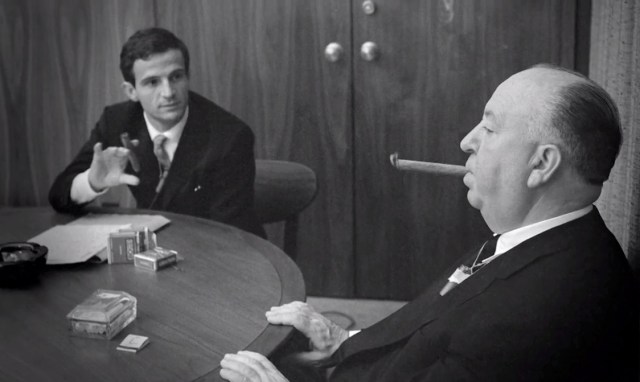
“Logic,” the great thriller director Alfred Hitchcock once intoned, “is dull.”
So don’t try to pin down the geography of the long chase that is “North by Northwest,” don’t question too deeply how “The Birds” were able to pin down an entire rural California town of Bodega (Bay) and don’t waste a moment of your life fearing for the safety of Cary Grant or James Stewart in any Hitchcock film they did.
Janet Leigh, of course, was another matter.
The moment Hitch made this declaration was a mid-1960s interview, and the person he made it to was the French critic turned director, Francois Truffaut. Truffaut was largely responsible for raising Hitchcock’s “action/mystery hack” reputation to the pantheon of artist of “the pure cinema.” And once he became a director himself, the two formed a mutual admiration society that Truffaut immortalized with the taped interviews that became the seminal book on Hitchcock and one of the great pieces of cinematic deconstruction in book form — “Hitchcock/Truffaut.”
Now “Hitchcock/Truffaut” has become a documentary film about “The Master of Suspense,” one built on those long-ago audio tapes. The two talk as peers, with Truffaut getting Hitch to defend his infamous “Actors are cattle” put-down, and dig into the layers of his lifetime of learning to make “pure cinema,” a filmmaker whose inner demons made it to the screen in movies visualized as perfect expressions of this most visual of arts.
“There’s no such thing as a face,” Hitchcock theorizes. “It doesn’t exist until the light hits it.”
He over-planned his pictures, visually, with storyboards. By the time he had to actually show up on set with actors hired to fulfill his vision, he was already a little bored with the story he was determined to tell with visual archetypes, tropes and clues.
Every so often, as he talks about the sexual subtexts of scenes and situations, he playfully orders Truffaut, the translator and the sound tech with them to “turn off the machine,” to say something more off-color than his image let on.
There’s Hitch, “acting” and cutting up on with double entendres camera with a starlet for a screen test in the early days of sound.
 Trained as an engineer, he dipped his feet into silent cinema as a designer, composer of inter-titles and then director as visual “writer,” the “auteur” or author of his films. It didn’t matter who the collaborating screenwriter was or who was credited with design and editing. Hitchcock’s movies bear his distinct signature, and are as instantly recognizable as “his” as any movies ever made bear the trademark of their creator.
Trained as an engineer, he dipped his feet into silent cinema as a designer, composer of inter-titles and then director as visual “writer,” the “auteur” or author of his films. It didn’t matter who the collaborating screenwriter was or who was credited with design and editing. Hitchcock’s movies bear his distinct signature, and are as instantly recognizable as “his” as any movies ever made bear the trademark of their creator.
The Kent Jones documentary adds a number of new interviews with filmmakers from Scorsese to Fincher, James Gray to Richard Linklater (perhaps the most astute analyst of Hitch), men inspired to pursue cinema as their means of expression by this watershed book.
I say “men” because this doc is something of a boy’s club. All the famous scenes sampled, from “The Lodger” to “Psycho,” “Notorious” to “Vertigo,” may lean heaviest on Hitchcock’s women — his great female stars. But no female critics appear, and even the surviving “Hitchcock blondes” were not interviewed for this film.
Truth be told, the new interviews don’t add much except for words of admiration for this Holy Text of film appreciation. And as the book was largely in a question and answer (transcribed from the tapes), the film offers no fresh revelations.
He was one of the first directors to become a “brand name,” like Capra and Ford and later Spielberg and Fincher (“Se7en”, “Zodiac”). We hear Hitch remark, in answer to a 1965 question, that his movies “aren’t old-fashioned,” something you could certainly say during his lifetime.
But even though none of the director/fans interviewed come out and say it, you have to wonder how true that is fifty years later. The sampled clips remind us of how Hitch handled foreshadowing (obvious enough for everybody in the audience to get it) and his simplistic (in step with the times) takes on psychology. They’re dated. They’d have to be.
The better filmmakers of today are much more subtle. Nobody interviewed here would have ended “Psycho” with Simon Oakland offering a paint-by-numbers psychological breakdown of Norman Bates. His movies might still resemble dreams (his dreams), but they can seem ham-fisted and entirely too on-the-nose in the casting, in the sexual predilections of his villains.
“Hitchcock/Truffaut” remains an influential book because the movies still resonate with nascent film buffs, and this documentary serves to remind us that we underestimate the creators of popular entertainment at our peril. All it takes is a Frenchman “discovering” the genius behind the work to make see the popcorn pictures of any era in a new light.

MPAA Rating: PG-13 for suggestive material and violent images
Cast: Alfred Hitchcock, Francois Truffaut, Martin Scorsese, Richard Linklater, David Fincher, Wes Anderson, James Gray, Paul Schrader, Peter Bogdanovich, Bob Balaban
Credits: Directed by Kent Jones, script by Kent Jones, Serge Toubiana. A Cohen Media Group/HBO release.
Running time: 1:19

Excellent review as always, Roger. Two of my favorite directors. I hope you don’t mind me reblogging this.